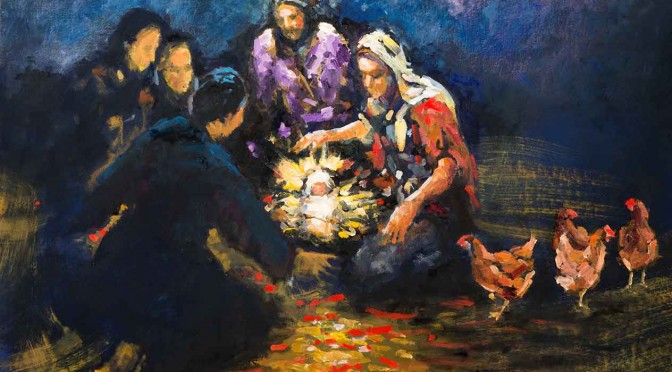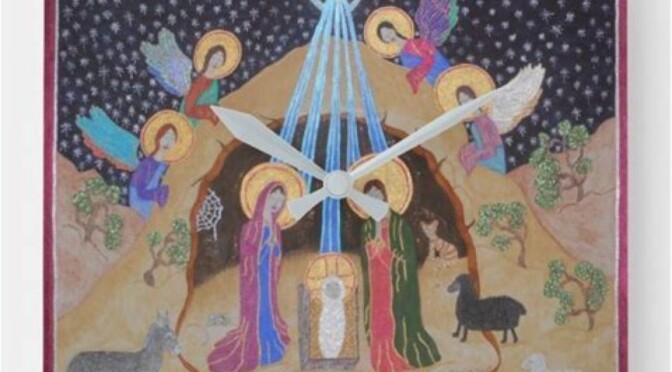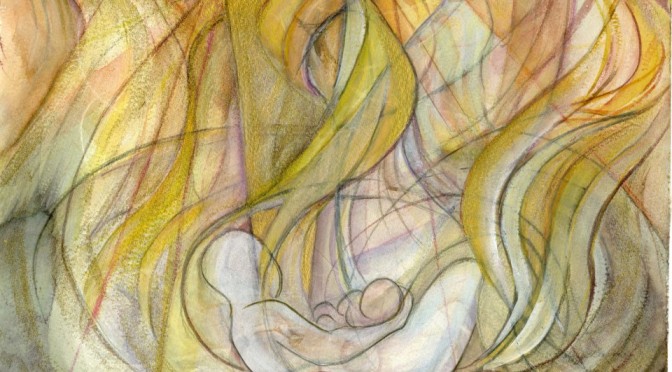sermon art: Guatemalan Nativity by John Giuliani, 1990s. See more at jbgicon.com
Caitlin Trussell at Augustana Lutheran Church, December 24, 2023
[sermon begins after two Bible readings]
Luke 2:1-20 In those days a decree went out from Emperor Augustus that all the world should be registered. 2This was the first registration and was taken while Quirinius was governor of Syria. 3All went to their own towns to be registered. 4Joseph also went from the town of Nazareth in Galilee to Judea, to the city of David called Bethlehem, because he was descended from the house and family of David. 5He went to be registered with Mary, to whom he was engaged and who was expecting a child. 6While they were there, the time came for her to deliver her child. 7And she gave birth to her firstborn son and wrapped him in bands of cloth, and laid him in a manger, because there was no place for them in the inn.
Isaiah 9:2-9
[sermon begins]
Last week’s Christmas pageant during our Sunday worship service included 30 children, with practiced with comedic timing, playing the parts of angels, soldiers, shepherds, wise magi, King Herod, Mary, Joseph, and animals – including a horse who said “kneeee” (neighed), a tiger who said, “whoooohw,” (roared), and a rabbit who said, “hop-hop.”[1] The angel Gabriel moved their chair, stood on it, smiled a ginormous smile and told Mary about a having a baby who will be the son of God, and Mary said, “Oh, okay!”[2] Then the same angel moved their chair across the stage, stood on it, and told Joseph in a dream that Mary is going to have a baby from God, that it’s okay to marry her and take care of the baby, and Joseph said, “Oh, okay!”[3]
Those kids in the pageant performed their ever-loving hearts out as they were our preachers last Sunday – telling us during the sermon time about a love story so powerful in the way that only children can. The back and forth between those of us in the congregation listening and laughing at their intentionally funny lines, and those kids up here in costumes telling us all about it, really came down to it all being about love. Because it is, you know. Christmas really is all about love.
Love includes the sentimental kind that beelines to our emotions. Many of us don’t tap easily or often into those feelings, so sentimentality has its place, reminding us of our humanity and that we may not be as tough as we think we are. Sometimes we don’t trust the sentimental for that reason. It can feel like an intrusion through our thick skin. While sentimental love has its place in warming hearts, greeting cards and sappy movies, it doesn’t tend to change the world. Although the birth of the baby we celebrate today is really quite an odd plan for saving the world.
Newly birthed and lying in a manger, wrapped in bands of cloth, his parents at the ready, although exhausted by their travel to Bethlehem and overwhelmed by the birth that changed not only their world but the whole world. Even if people don’t believe in Jesus as the son of God, there is general agreement that Jesus arriving on the scene impacted life on this planet as Jesus followers alternately do dunderheaded, painful things to the world and its people; and also do unbelievably good, powerful things with and for our fellow humans.
How we get from a baby in a manger, who is supposed to save the world through love, to malevolent morality that isn’t at all merry. And by that, I mean the judgy things we do to ourselves and each other that dehumanize each other, that wage wars personal and political, and rob each other of worth and love. We limit God’s love by drawing lines between who’s lovable and unlovable, lines that have nothing to do with God and everything to do with who we don’t like. After all, this little baby Jesus, a.k.a. the Savior, a.k.a. the Prince of Peace, grows up to teach us to love our enemies because it’s the only way from war to peace. Jesus lived his life constantly expanding the circle that people use to limit who’s in and who’s out. He ate meals with unlovable people, he had public conversations with women no one spoke to, and he had secret conversations with religious leaders who opposed him by day. The list is endless of his ever-expanding circle of saving love.
It turns out that the Prince of Peace Savior that the angels sang about was born utterly dependent and vulnerable. That God meets our vulnerability, our fragile bodies, and our fickle natures by first arriving in a baby’s body – just about as fragile and vulnerable of a body as can be had. And from this baby’s body grew the Jesus who showed us how much we are loved by God and the lengths to which God goes to help us love ourselves and to help us love our neighbors. I’m not sure why it’s so difficult to live in love. Perhaps because it’s easier to be afraid of each other or angry with each other or morally superior to each other, than it is to actually love each other. It’s easier to put ourselves and others down, than it is to see what God sees when God looks at us through Jesus’ eyes. We are broken and beloved humans with a God who loves us first. A God who loves us for the ways we are created good and a God who loves us despite the ways we make a mess of things. This is the Christmas story we get to tell each other like our children did in their pageant last week.
We’re not going to say the right things and get this message perfectly communicated. But we can try to talk about the love that God has for us and what’s it means to us. At the end of the day and at the end of our lives, that’s what we get. The good news of the Christmas baby is that we are loved beyond measure by a God who keeps trying to get our attention. What better way to get our attention than to show up in a baby. Babies are hard to ignore and remind us of the care we all need at various times in our lives. Our pain, our suffering, and our need for love are part of what we wrap our thick skin around, thick skin that keeps out the love we may need most. It really is all about love. About God loving us first and freeing us to love each other. So simple and yet we make it so complicated when it really is all about love.
Last Sunday, as I was presiding over Holy Communion, the manger from the Christmas pageant was in my line of sight below the altar as I chanted the prayer. It was visual poetry, a reminder that in fragile, unexpected places like the manger of communion bread and wine, Jesus’ presence is promised to you as a gift of love this Christmas. We cradle his presence with our fragile hands as we receive communion. You are here and you are welcome. It really is all about love.
That first Christmas Day, we received a great gift in the tiny child, Jesus. A baby in a manger wrapped in bands of cloth, a love letter enveloped in skin and solidarity, reminding us that God’s love is good news of great joy for all the people – loving us for ourselves, just as we are. There is nothing we can do or not do to make God love us any more or any less because God is love.[4] It really is all about love. Amen. And Merry Christmas!
_________________________________
[1] Watch our pageant here [minute 27:20]: www.youtube.com/watch?v=hqAEsYXvFR4
[2] Luke 1:26-38
[3] Matthew 1:18-22
[4] 1 John 4:8

![Christmas Really is All About Love [OR Malevolent Morality Isn’t Merry] Luke 2:1-20 and Isaiah 9:2-9](http://caitlintrussell.org/wp-content/uploads/2023/12/John-Giuliani-Guatemalan-Nativity-1990s.sermon-Caitlin-Trussell-672x372.png)

![Craving Christmas [OR A Brief Ode to Rob’s Cookies AND the Christmas Story]](http://caitlintrussell.org/wp-content/uploads/2022/12/Robs-Cookies-2022-672x372.jpg)

![A Manger – Flawed and Real Luke 2:1-20 [Advent/Christmas Worship with our Home-Centered Folks]](http://caitlintrussell.org/wp-content/uploads/2019/12/manger.sermon-Caitlin-Trussell.jpg)

